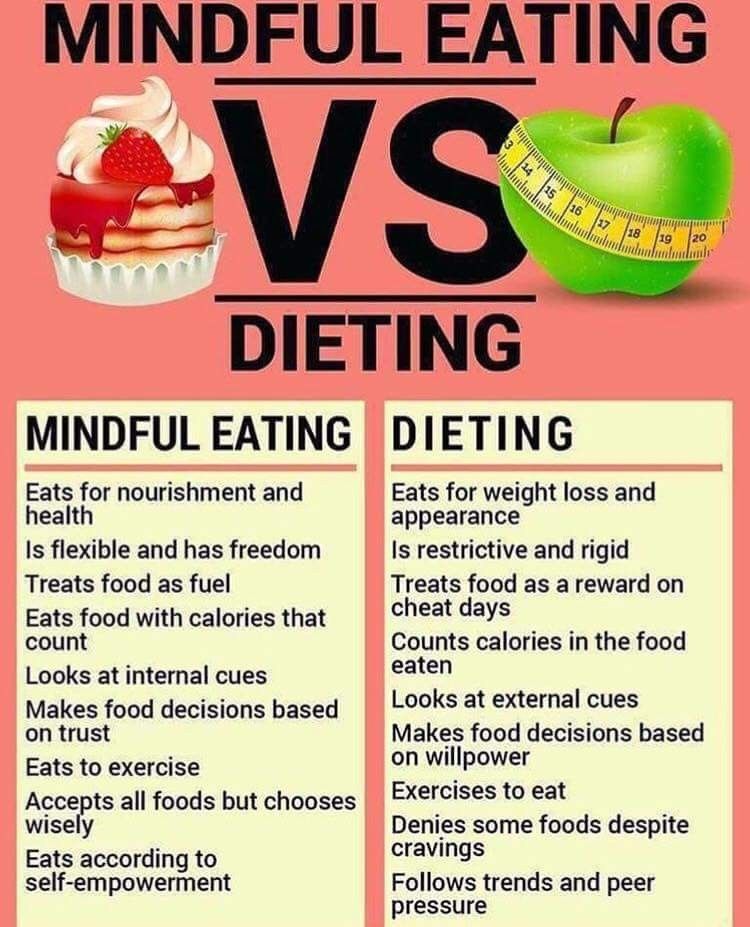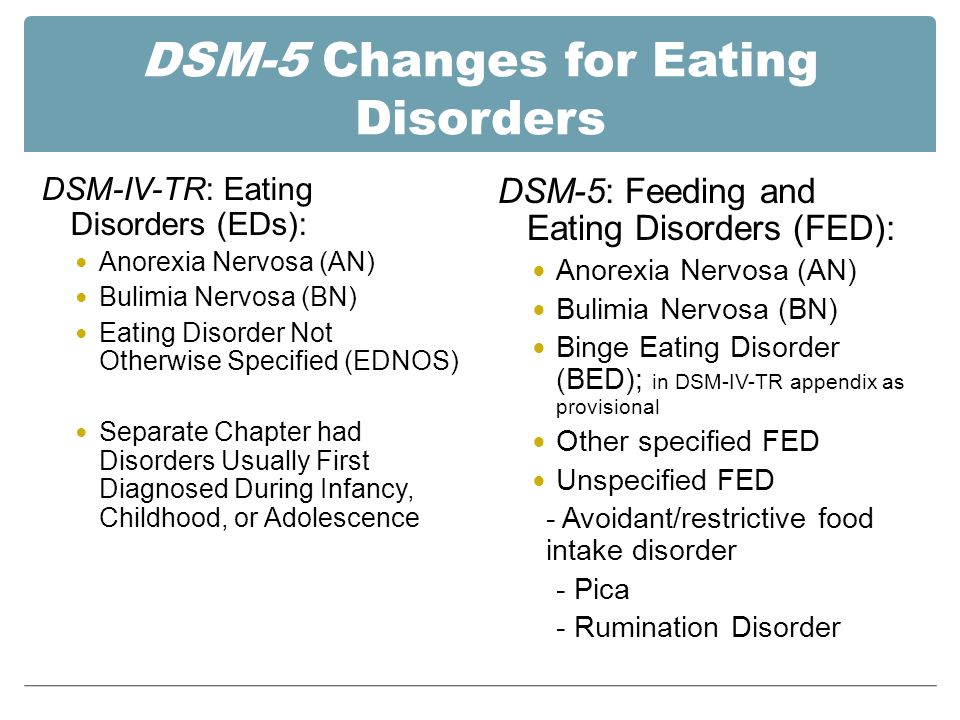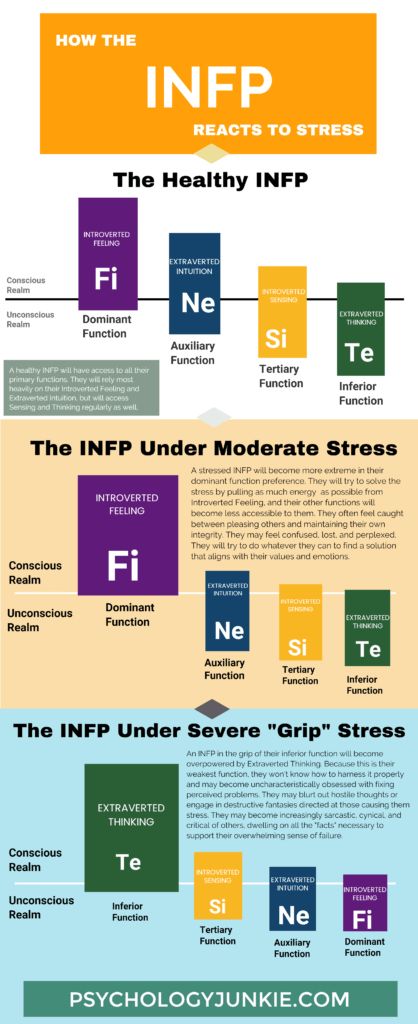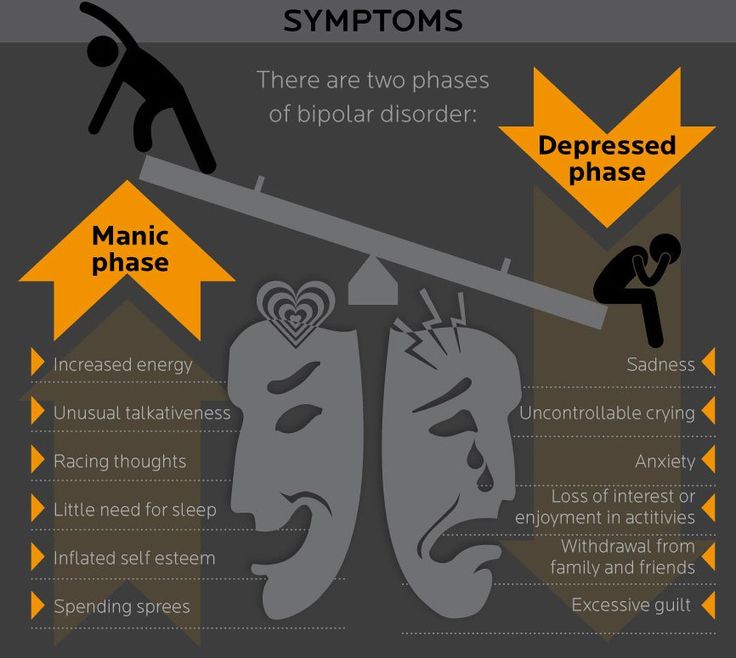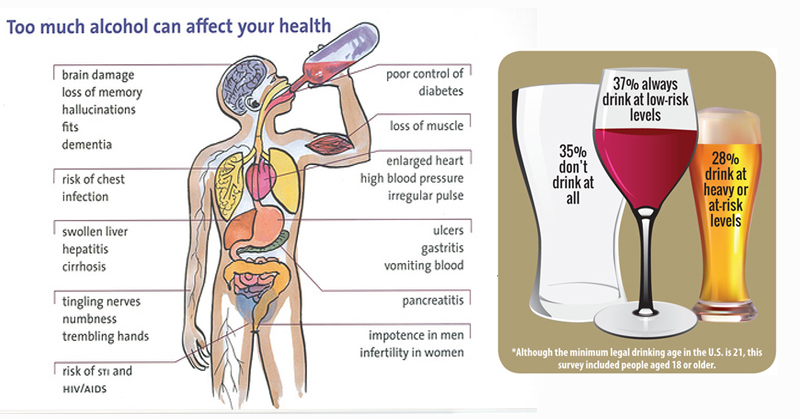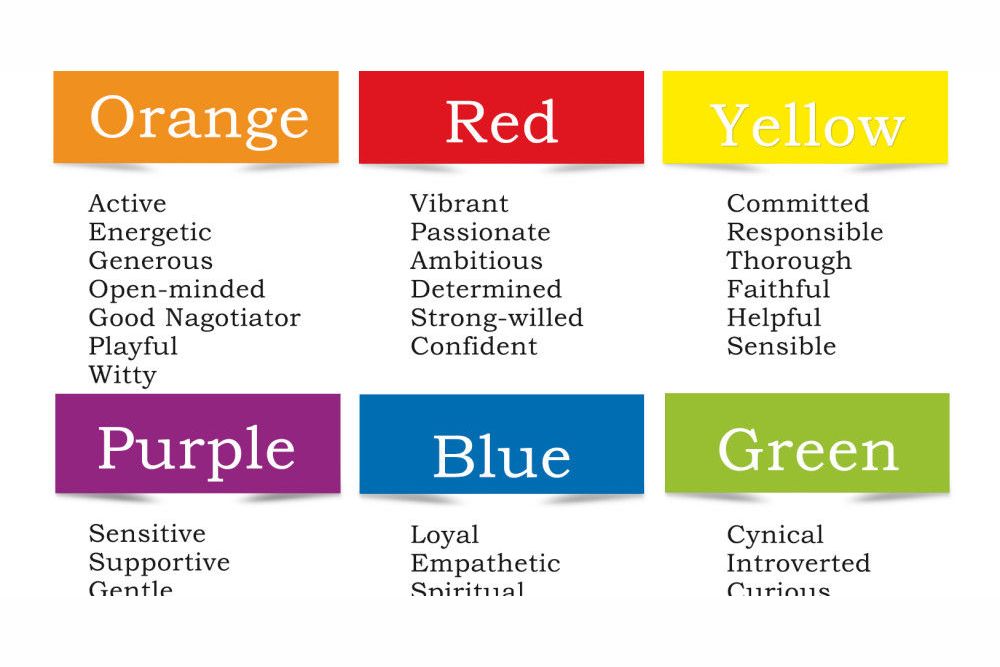Mindfulness eating script
Mindfulness Eating Script for Weight Loss
Are you struggling to lose weight? Try our Mindfulness Eating Script for weight loss to become fully aware of the "WHY" you are eating & the "WHAT" you are are eating. We can't wait for you to try it today. It's a game changer!
Have you tried fad diets and self-imposed food restrictions but gained all the weight right back? You are not alone!
Maintaining a healthy diet and lifestyle are not a quick fix and cannot be solved based on will power alone. You must get to the bottom of “Why” you are eating in the first place.
Today, we are going to share with you a psychological approach that gets to the root cause of overeating and emotional eating. This guided holistic mindful eating approach along with an exercise tool called the
Mindfulness Eating Script for Weight Loss is a game changing solution. With dedicated practice and a good coach, you will see positive results that can last a lifetime.
Are your ready to have a healthy relationship with food and live a healthy life? Let’s dive into what makes this novel mindful eating approach so effective.
Jump to:- So, what is Mindfulness?
- What is Mindful Eating?
- Who is the Founder?
- Can it Help Me?
- How Does it Work?
- Physical Hunger vs Emotional Hunger
- What are the Benefits?
- Eating Affirmations Basics
- Rituals of Mindful Intuitive Eating
- Mindful Eating Exercise Script
- Final Thoughts
- Frequent Asked Questions (FAQ’s)
- Healthy Tips For Happiness Educational Posts
Let’s start out with defining some basic concepts.
In simple words, being Mindful means to pay careful attention to every moment that we live in. It is a discipline that encourages us to take good care of ourselves by being deliberate and present in the moment. Mindfulness makes one become more “mind-aware” and “body-aware”.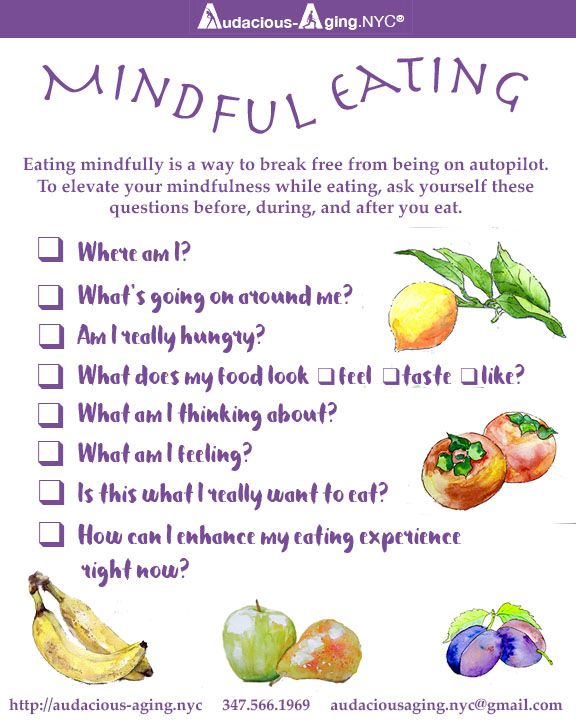
Do you ever find yourself with a bag of chips on your lap on the couch while you are watching TV and can’t believe a half a bag is already gone? Have you ever just eaten because it is time to eat but are not hungry? These are all examples of NOT being mindful while you are eating.
Mindful eating is about being aware of all your senses, emotions and triggers that make you want to eat. Do you eat because you are sad, scared, depressed, bored, and overwhelmed or because you are physically hungry?
A key to this process includes gathering sensual awareness of the whole eating experience. It brings more deliberate attention to the food that we eat self-checking our emotions, satiety and not just fullness cues. It trains the brain to reinterpret the signals from the body, urging one to “Eat only when physically hungry and stop when feeling satisfied”.
Who is the Founder?One application of “Mindful” or “Mindfulness” comes from a scientist, author and practicing Zen Buddhist - Jon Kabat-Zinn.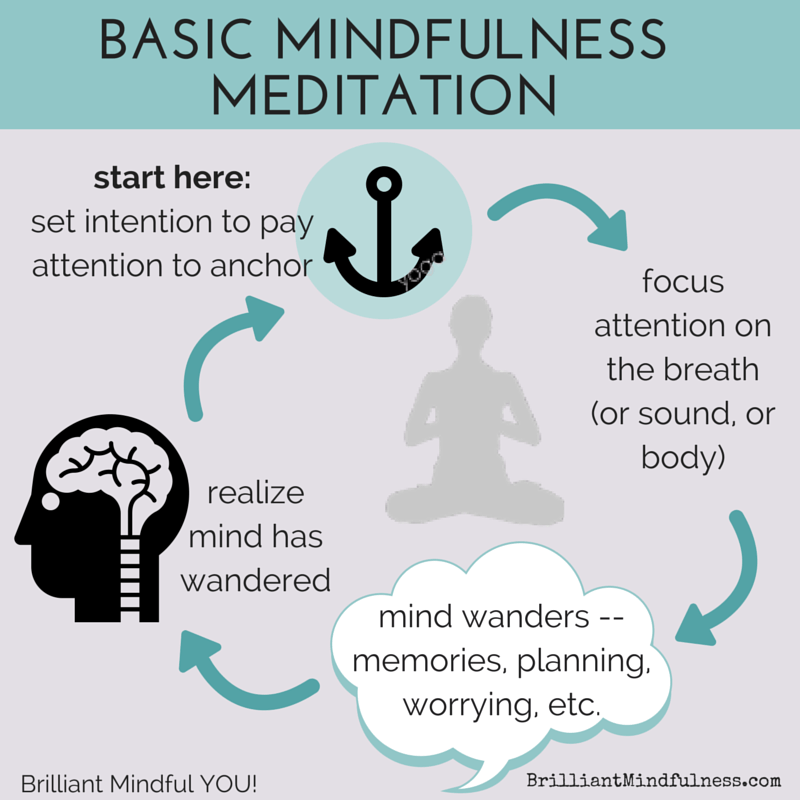 He is the founder of the Mindfulness-Based Stress Reduction (MBSR) Program at the University of Massachusetts Medical School. Kabat-Zinn shared his teachings in his book Full Catastrophe Living (1990), outlining therapeutic techniques using meditation, yoga, journal writing, breathing techniques and other strategies to help people understand how to reduce stress.
He is the founder of the Mindfulness-Based Stress Reduction (MBSR) Program at the University of Massachusetts Medical School. Kabat-Zinn shared his teachings in his book Full Catastrophe Living (1990), outlining therapeutic techniques using meditation, yoga, journal writing, breathing techniques and other strategies to help people understand how to reduce stress.
Mindful therapeutic techniques have helped patients overcome chronic pain, anxiety, and depression by getting to the “real” core reason behind the problem. More recently, clinicians, such as mind body eating coaches, have helped numerous patients have a healthy relationship with food and weight management using this same type of strategy. If you have trying to lose weight due to health condition or have had issues keeping the weight off, mindful therapeutic techniques and therapies may be good option for you.
Today, we are going to zero in on the Meditation technique using a Mindfulness Eating Script for Weight Loss that will help you get some answers about the “WHY” you are eating.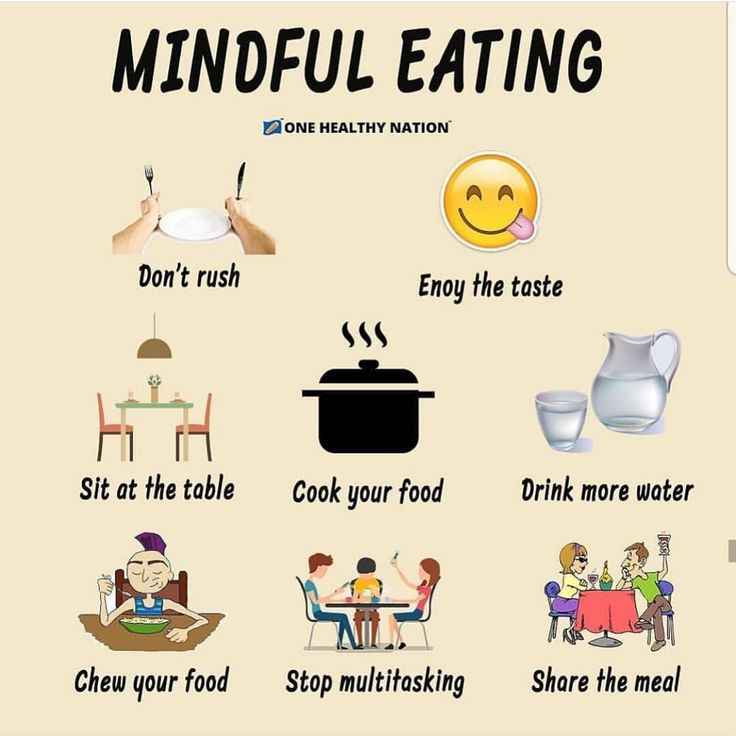 Before we start on that, let’s review some basic concepts.
Before we start on that, let’s review some basic concepts.
This therapeutic technique helps you develop a healthier relationship with food by dissociating emotional hunger with food. This is accomplished in several different ways that include:
- Teaching you to become aware of your physical hunger by connecting your mind and the body through self-awareness.
- Acknowledgement of your emotions and feelings around the eating experience.
- Increasing your awareness of the physical sensations in your body and your response to food.
- Re-establishing the lost connection with your own internal biological clock. As a child, you were probably taught to eat everything in front of you and as programmed by the time of day. Being mindful will teach you to eat only when feeling “real” hunger – not just because it is 6 o’clock dinner time. In addition, you don’t have to clean your plate.
Is it actual real physical hunger or is it emotional hunger? Emotional hunger is a term for a psychological need that really can’t be met with eating - it just masks the underlying problem.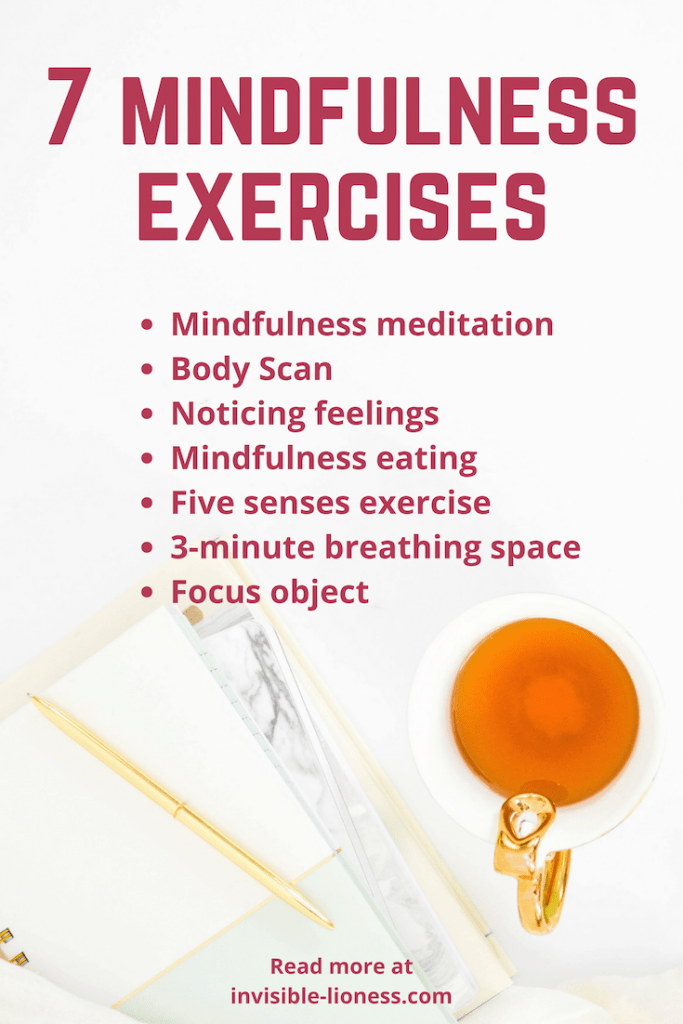 For example, are you sad, lonely, stressed, bored, overwhelmed, or tired? Are you reaching for food to soothe your self because you have an unmet psychological need?
For example, are you sad, lonely, stressed, bored, overwhelmed, or tired? Are you reaching for food to soothe your self because you have an unmet psychological need?
According to the Mayo Clinic, here are the difference between emotional hunger and physical hunger…
| Emotional Hunger | Physical Hunger |
| Comes on suddenly | Comes on gradually |
| Crave certain foods | Open to eating any food |
| Not satisfied with fullness | Feel full and can stop eating |
| Feel guilt or shame | Don't feel bad |
- Helping you to develop body respect.
- Avoiding binge and emotional eating which are the two main causes for excessive weight gain.
- Recognizing the reasons and the motivations behind “why” you are eating.
- This process makes us more responsible while choosing the ingredients for our meals.
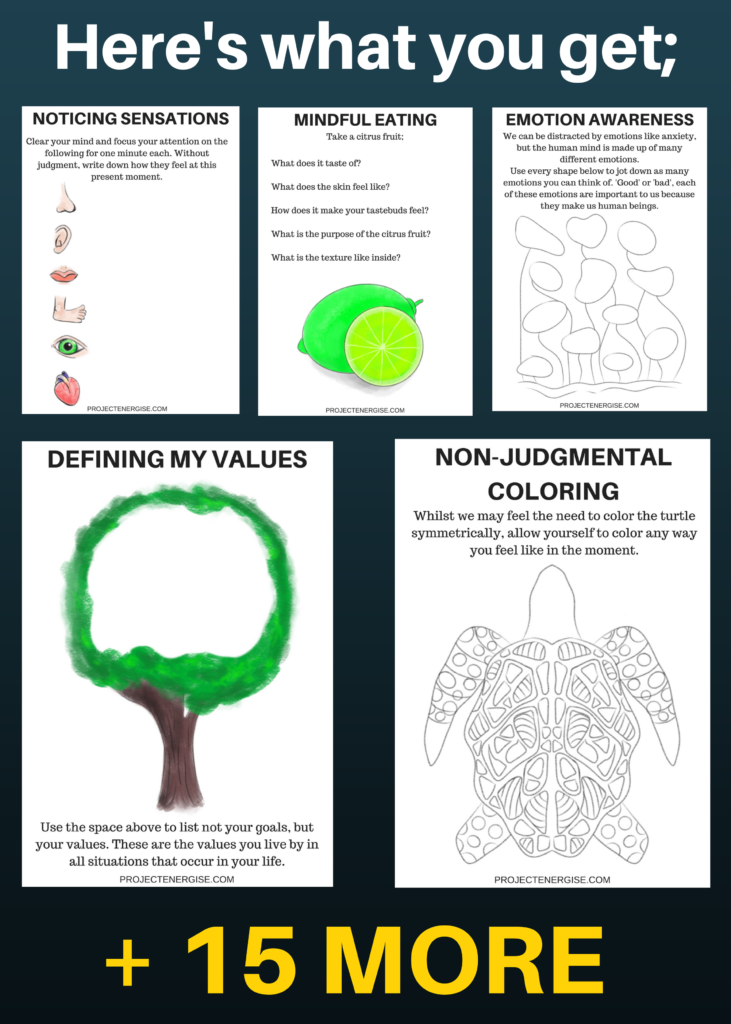 It turns cooking into a meditative practice.
It turns cooking into a meditative practice. - It brings focus to the day and avoids the anxiety and guilt associated with eating food.
- Prevents the epidemic of disordered eating or eating disorders like bulimia, anorexia, etc.
- The mindful eating challenge works at the cognitive level. It allows us to question the ‘WHY’ behind whatever we are doing.
- Most importantly, the Mindful Eating conscious living methodology can help us with our choices in other areas of our lives as well.
- Honoring our Self: First things first. Please do not diet to meet someone else’s standards on body shape and size. The emphasize should be acceptance of yourself for who you are and where your potential lies, so you can find a happy journey towards your goals.
- Have no guilt: When you eat because you are truly physically hungry, it is nourishing for the body.
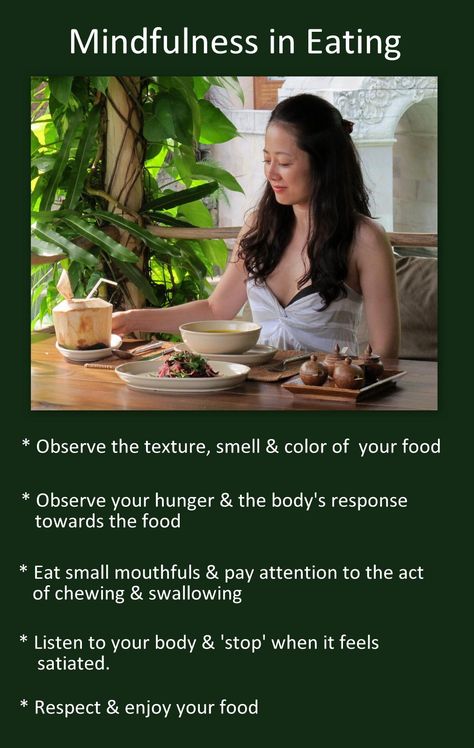 There is no need to feel guilty or anxious about eating to survive. Food should no longer be labeled as either good or bad.
There is no need to feel guilty or anxious about eating to survive. Food should no longer be labeled as either good or bad.
- Eat from Abundance not Scarcity: Have you ever stopped buying something at the grocery store because you felt you might eat the whole bag of cookies in one day if you did? If you gave yourself unconditional permission to eat something when you wanted to at any time, you might not eat that whole bag in one sitting. You might say to yourself, I will eat 2 cookies today, but I know I can have more on another day because it will still be there for me.
- Body respect: This new way of intuitive eating will help you exercise self-control and eliminate emotional eating. One can develop body-respect and body-positivism by addressing the actual unmet psychological needs that are leading to one’s overeating. After you find the underlying cause of your need to soothe your feelings with food, you can start the healing process.
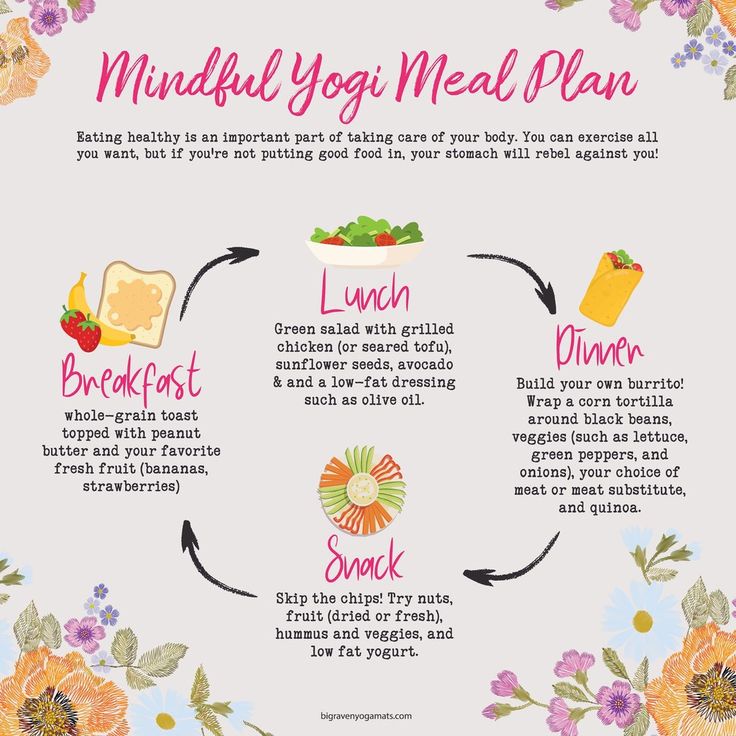
- Feed your physical hunger but soothe your emotional hunger with other non-food strategies. We will talk more about that in the Step By Step Checklist section below.
- Grocery Shop with Purpose - The best place to start is with your grocery shopping. The more you learn about who grew your food, how your food was grown and the cultivation process, the more intentional and thoughtful your grocery shopping will become. Don’t forget to take note of the quality of the ingredients and eating in season too.
- Set your intention to eat.
- Allow time to eat, sit down- savor each bite.
- Eat to honor your physical hunger, recognize it and act in time.
- Move away from distractions. Turn off the TV, social media, emails, or other distractions.
- Have small conversations – avoid lengthy discussions around food.
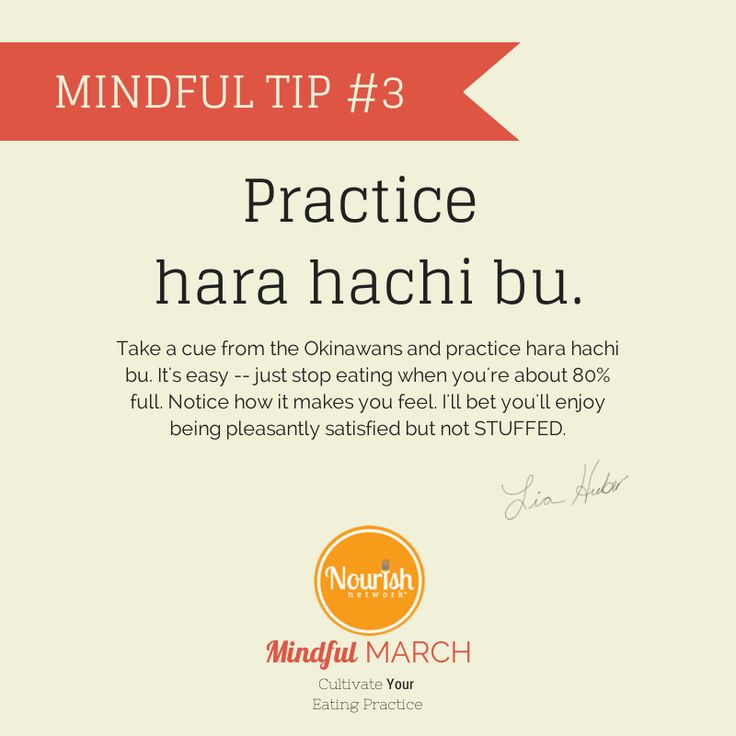
- Chew your food slowly and eat slowly before moving on to the next bite of food.
- Reconnect with the body’s natural signals - Watch for satiety. Stop when satisfied.
- Be grateful for every morsel.
- Stop food abuse - manage emotions without food, address them for what they are.
- Gain nutrition knowledge - Learn about nutrition, about food and about your body.
Try applying this guided meditative process during your next meal, with a single raisin, or even a slice of orange. This mindful eating script is adapted from the mindfulness expert, Jon Kabat-Zinn, who says “When we taste with attention, even the simplest foods provide a universe of sensory experience.”
Step By Step ChecklistStep 1: Read the script at a slow and steady pace.
Step 2: Recognize your hunger.
- First, are you physically hungry?
- Does everything in the refrigerator sound good to you or only that piece of pie or bag of chips? If everything and anything looks good, it is probably hunger.
 On the other hand, if you are only craving that one piece of pie or salty chips, that is not “true physical hunger” but “emotional hunger”.
On the other hand, if you are only craving that one piece of pie or salty chips, that is not “true physical hunger” but “emotional hunger”. - Is your body sending physical signals such as your stomach rumbling or feeling shaky or irritated?
- If you are not physically hungry, check your emotions. Are you sad, overwhelmed, stressed? Food will not fill the void of the emotional support you need. Do not eat if you are not hungry. Instead, address your emotional needs or try these suggestions to learn how not to think about food.
- Call a friend.
- Write in a journal.
- Get a breath of fresh air.
- Get organized.
- Make a to do list.
- Exercise and burn off that excess negative energy.
- Read Love Your Liver to help you reduce anxiety and stress.
Step 3: If you are physically hungry, say your prayer or express gratitude with the food in front of you.
Step 4: Observe the food, its smell, its color, its form, texture, and temperature.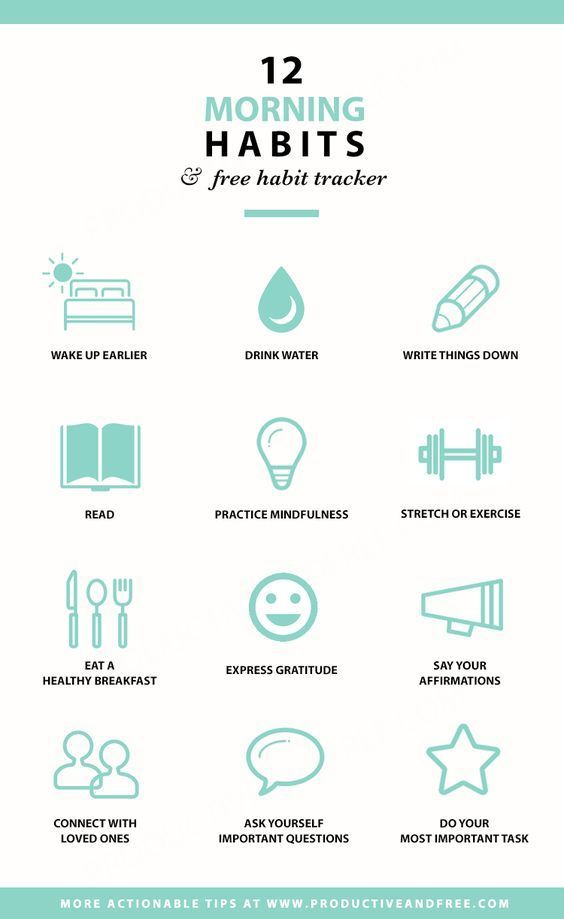
Step 5: Take the first bite, don’t chew it straight away. Close your eyes.
- Feel the food in your mouth.
- Does it remind you of something?
- Have you eaten this food before?
- Did it smell the same?
- Slowly bring all your conscious attention to your mouth, tongue, food, and flavor.
Step 6: Now chew it! Slowly, slowly chew it at least 15-20 times. Chew thoroughly until the morsel turns into a fluid completely. Now, “drink” your food. Did you know that chewing (also known as mastication) is one of the most important steps in digestion? Chewing your food well makes it easier for nutrients to be broken down for absorption to help Nourish your Body.
Step 7: Check your thoughts.
- Do you have racing thoughts trying to distract your attention from the bite?
- Are you in a rush to swallow before you thoroughly have chewed?
- Does your mind wander away and do you have to work harder to refocus on the food in your mouth?
Step 8- Repeat and enjoy this meditative process until the meal is complete or more importantly until you feel satiated or even just before. Please take note on how your relationship with food changes just by becoming aware of what you are eating and how your body is reacting to the stimulus of food.
Please take note on how your relationship with food changes just by becoming aware of what you are eating and how your body is reacting to the stimulus of food.
Food can either help or hinder. As human beings, we are preprogrammed to eat food for survival. Often activities in our lives go unnoticed until things get out of balance. If you are reading our Mindfulness Eating Script for Weight loss post, most likely you are looking for a weight loss solution.
Rather than downloading a mindful eating app or going on a 30-day weight loss challenge, invest in learning about your body, reconnect your mind with your body and come off the autopilot eating habit. If you would like assistance in becoming a more Mindful eater, hiring a Mindful Eating coach is a great place to start.
Truly, we are what we eat. The art of mindful eating is a way of living that can transform our health and our relationship with food. It is not a one time, and you are done type of change.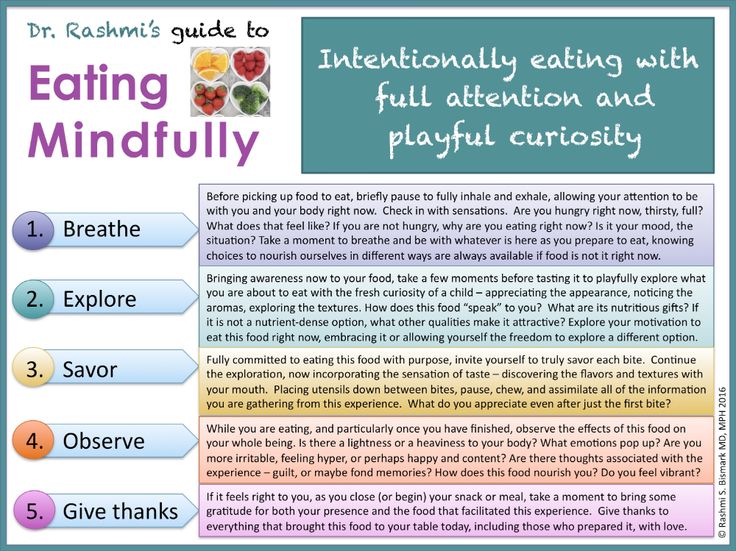 It is a lifestyle change.
It is a lifestyle change.
What is the difference between Mind Full and Mindful?
Mind Full is being overwhelmed and lots of thoughts going on inside your mind. Whereas being mindful is being cognizant of your thoughts and how it is affecting your body.
How not to think about food?
1. Use distraction such as calling a friend, going for a walk, work on a project that is not food related.
2. Remove yourself from the kitchen or other places where your food is stored.
3. Journal about your feelings, assess them and make an action plan to fix the things that can be fixed and accept those that can’t.
4. If you are tired, your brain will sometimes make you think you need to eat because it needs glucose to keep working. Maybe it would be better to go to bed early or take a short nap.
5. Try drinking a warm cup of herbal tea without any sugar, honey, or cream. Cinnamon tea, especially, is a natural appetite suppressant.
Healthy Tips For Happiness Educational Posts
Want to learn more? Subscribe to our Newsletter and follow along on Facebook, You Tube, Instagram, and Pinterest for all the latest updates.
Mindful Of Your Food And Eating
More Meditation Scripts
Mindful of Your Food And Eating. This script encourages heightened awareness of one’s experience during a simple bite. Since we don’t often eat in this slow and mindful way, this practice is a powerful application of mindfulness that will spark some interesting conversations around the table.
...If You'd Like to Download this Entire Guided Meditation Script for FREE, Just Enter Your First Name and Email Address:
Eating Mindfully
Eating is an opportunity to nourish your body while nourishing your mindfulness practice.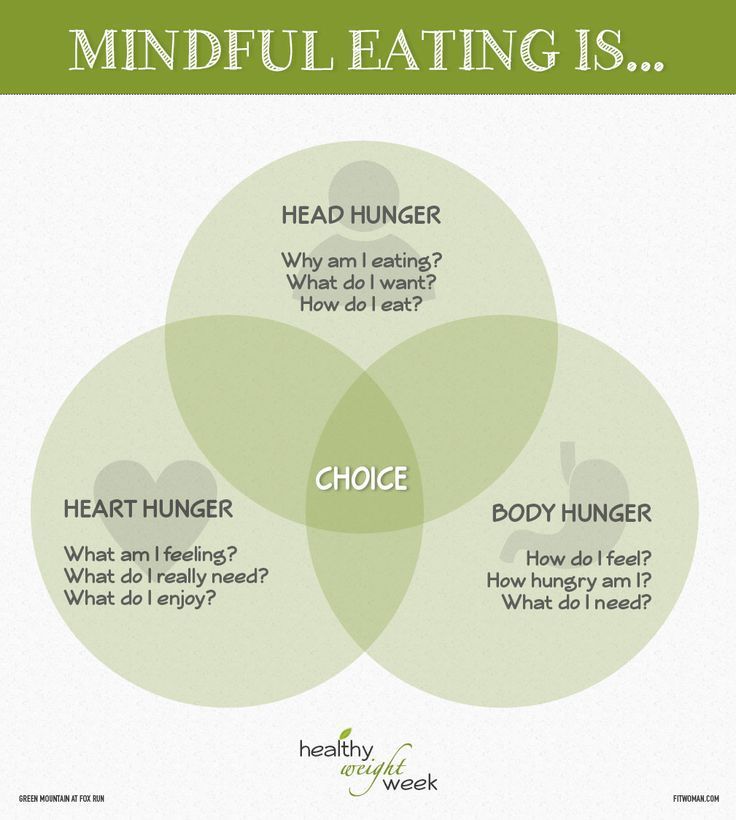
You can do this practice in any position, but it is helpful to stay still while eating.
This minimizes unnecessary stimulus and helps you focus on the experience.
You can do this with any food. I recommend starting with something simple, like raisins, berries, or a few of your favorite vegetables.
Begin by taking in the food visually. Notice the colors, shapes, and sizes.
As you look at the food, notice the urge to start eating.
There is nothing wrong with hunger, but allow the cravings to come and go.
Return to the sight of the food.
Next, investigate the smell of the food.
Some foods may have stronger aromas than others, and you may have to hold the food up to your nose
Be present for the experience of smelling.
When the mind begins craving, just return to the smell in front of you.
Before eating, take a brief moment to appreciate the energy that went into its production.
People worked to grow this food and bring it to you.
Nature provided nutrients, rainwater, and sunshine.
Maybe somebody cooked, cleaned, or packaged it for you.
Bring into your mind all of the energy from various sources that came together to create this meal.
Now, slowly pick up the food.
...If You'd Like to Download this Entire Guided Meditation Script for FREE, Just Enter Your First Name and Email Address:
Useful LinksInstance 1
330 Mindfulness WorksheetsStep-by-step guidance for developing mindfulness for your health, relationships, career, meditation and more!
50% OFF
- Safely download them all to your own computer
- Nicely designed PDF's with writable fields to add your reflections, answers and journal entries
- Expertly designed for both beginners and advanced mindfulness practitioners
- Organized into separate folders, based on health, relationships, career, self-discovery, purpose, formal meditation, and more
- Evidence-based practices for increasing a sense of peace, calm, clarity, care and confidence
- 100% Money-Back Guarantee
Learn More
200+ GUIDED Meditation ScriptsDiscover the world's most popular mindfulness meditation scripts that make a positive impact on people's well-being.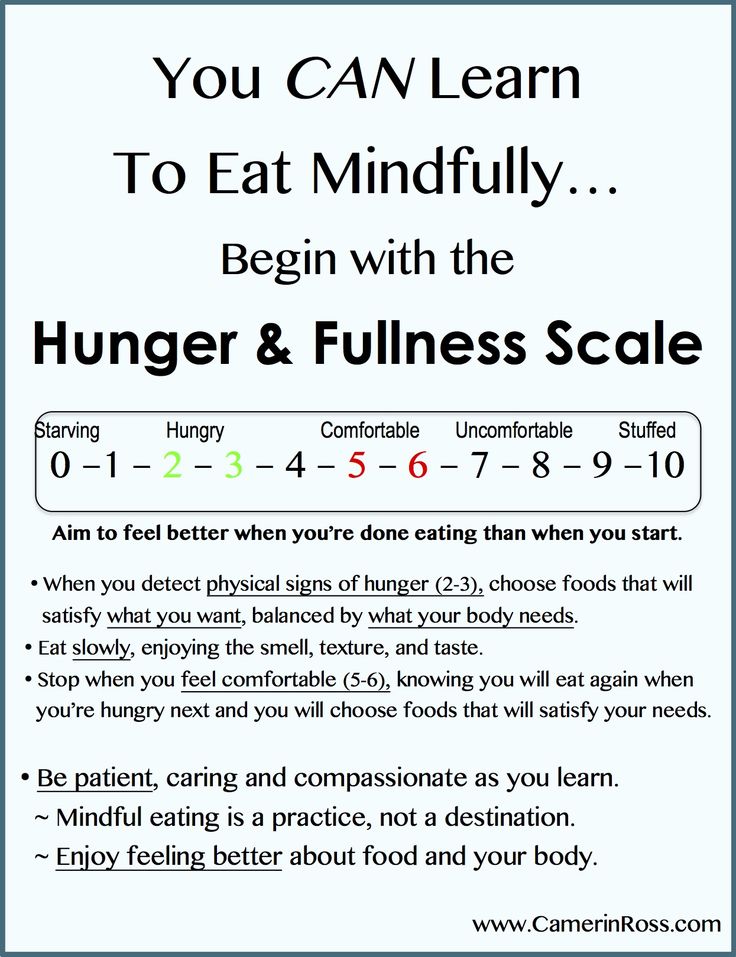
50% OFF
- Safely download them all to your own computer
- Elegantly formatted for you to read easily and confidently at your own pace
- Learn how to do many new mindfulness meditations , while deepening your experiential understanding of the one's you're practiced
- Evidence-based meditations for cultivating calm, self-compassion, embodied presence and resilience
- Guide these meditations for others to make a positive impact on the qualify of their day-to-day lives
- 100% Money-Back Guarantee
Learn More
7 principles of conscious eating or a feast without consequences -
New Year holidays are a real test even for those who eat right and lead a healthy lifestyle: after a generous New Year's feast with family, we go to visit friends and relatives, to Christmas meetings in cafes and restaurants, to grandma for treats…
Even if you adhere to the principles of a healthy diet and try to choose only healthy foods for the festive table, after a series of holidays and plentiful treats, it is quite possible to gain a couple of extra pounds, feel such unpleasant symptoms as bloating, heaviness, fatigue and drowsiness. Quality products on the festive table - that's not all. Equally important is how we eat. nine0003
Quality products on the festive table - that's not all. Equally important is how we eat. nine0003
Previously, a long feast was a difficult test for me, breaking healthy habits, even those developed over the years. I want to share with you 7 principles of mindful eating that will help you get maximum pleasure without harm to health, the risk of gaining extra pounds and a darkened mood! I would like to call them simple, but like any practice, they get better with time.
Mindful eating refers to the practice of being in the here and now. When thoughts take us away from the process of eating, it is difficult for us to control the feeling of satiety. Research has shown that practicing mindful eating helps improve eating habits. It is especially useful for those who cannot refuse another glass of wine, are prone to jamming emotions and stress on cookies, junk food, and experience uncontrollable cravings for certain addictive foods. nine0003
Conscious eating will help you fully enjoy the taste of New Year's dishes without overeating and consequences.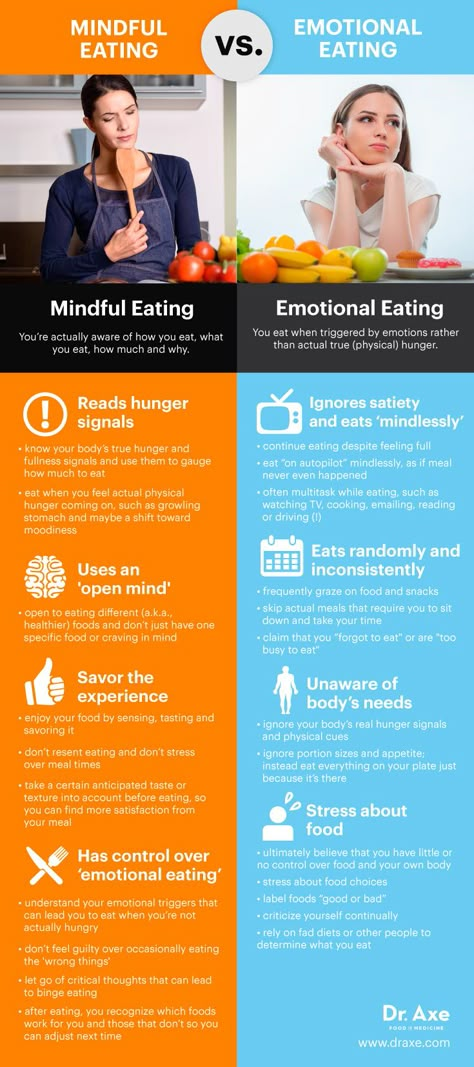 You will say that it is impossible to observe these principles at the New Year's table: in the circle of friends and relatives you will keep up the conversation, be distracted by TV or music, like a caring hostess - run to the kitchen, take care of the guests ... I want to invite you to implement these principles one by one now. This will help you develop an optimal table behavior pattern for you and the ability to feel a balance between a comfortable state and excess. Share the secrets of mindful eating with your friends, colleagues, sisters! I am sure that thanks to the principles of conscious eating, this year's festive feasts will only be joyful and bright for you! nine0003
You will say that it is impossible to observe these principles at the New Year's table: in the circle of friends and relatives you will keep up the conversation, be distracted by TV or music, like a caring hostess - run to the kitchen, take care of the guests ... I want to invite you to implement these principles one by one now. This will help you develop an optimal table behavior pattern for you and the ability to feel a balance between a comfortable state and excess. Share the secrets of mindful eating with your friends, colleagues, sisters! I am sure that thanks to the principles of conscious eating, this year's festive feasts will only be joyful and bright for you! nine0003
The mindful eating practice I describe below is an excellent strategy for a Healthy New Year scenario .
More
- Surveillance
Before you sit down at the table, take a moment to observe how you feel at this moment.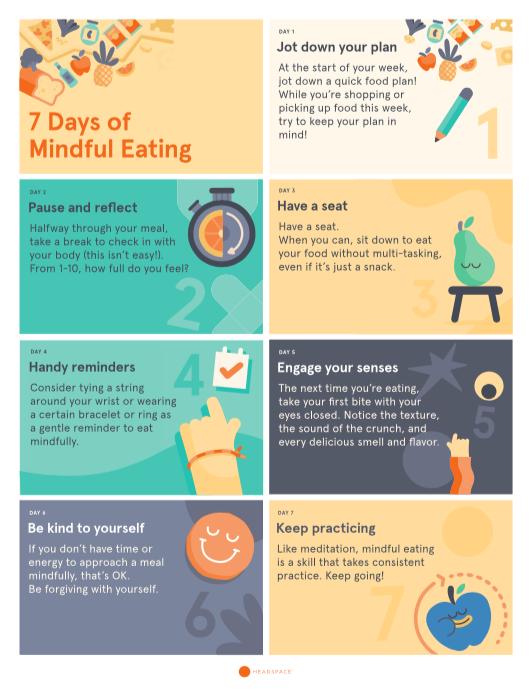 Is there a feeling of stress, hunger, rush, confusion or excitement? Try to calm the sensations and even out the emotional background. To do this, a simple concentration of attention on the breath for a minute is enough. When your cravings are controlled and not driven by emotions, the risk of overeating out of excitement or even joy is much less. nine0003
Is there a feeling of stress, hunger, rush, confusion or excitement? Try to calm the sensations and even out the emotional background. To do this, a simple concentration of attention on the breath for a minute is enough. When your cravings are controlled and not driven by emotions, the risk of overeating out of excitement or even joy is much less. nine0003
Return to introspection. During the New Year's table, you will most likely communicate a lot and therefore it will be difficult to keep track of the amount eaten. Find the opportunity to take a couple of pauses and observe the sensations. If this is not very convenient to do at the table, go to the bathroom or into the next room and observe your breath.
- Gratitude.
Before eating, take a moment to think and thank (inwardly or aloud, if appropriate) all those people who contributed to the creation of a generous table - farmers, sellers, the hostess who prepared the food, the fertile land, the creator and those who share a gala dinner with you.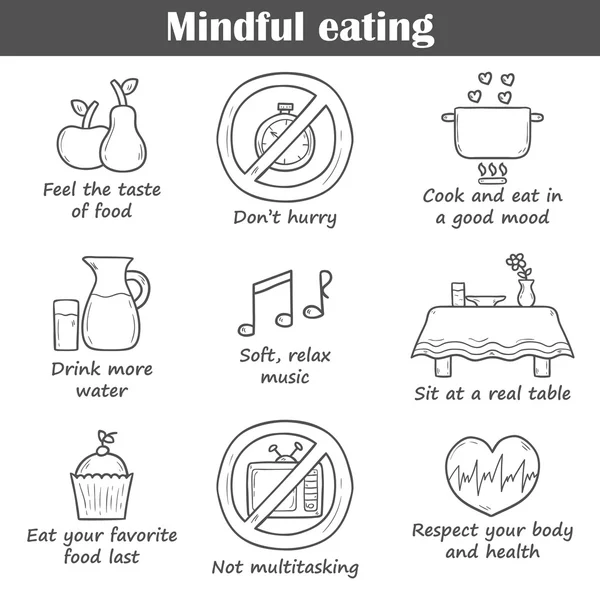 Enjoy the food - the taste, the look, the aroma, the selected ingredients, the mastery of the hostess! Practicing gratitude will help you connect with what you eat and how you feel. nine0003
Enjoy the food - the taste, the look, the aroma, the selected ingredients, the mastery of the hostess! Practicing gratitude will help you connect with what you eat and how you feel. nine0003
3. Do not intercept while running.
If you are a hostess and prepare New Year's treats as a hostess, you will definitely have to try all the dishes. Try to taste just a little, so as not to fill up before the gala dinner and not feel superfluous at the table. If you know that you will have to try many dishes and several times, give up one meal during the day or a snack, or do not swallow the food that you are trying.
Every time we snack in everyday life, and especially if we do it often, we lead to an imbalance of the hormone leptin, which is responsible for the feeling of hunger. The longer the intervals between the main meals, the more real the feeling of hunger and satiety will be.
- Apply 1 serving.
Try to follow the rule: try each dish only 1 time.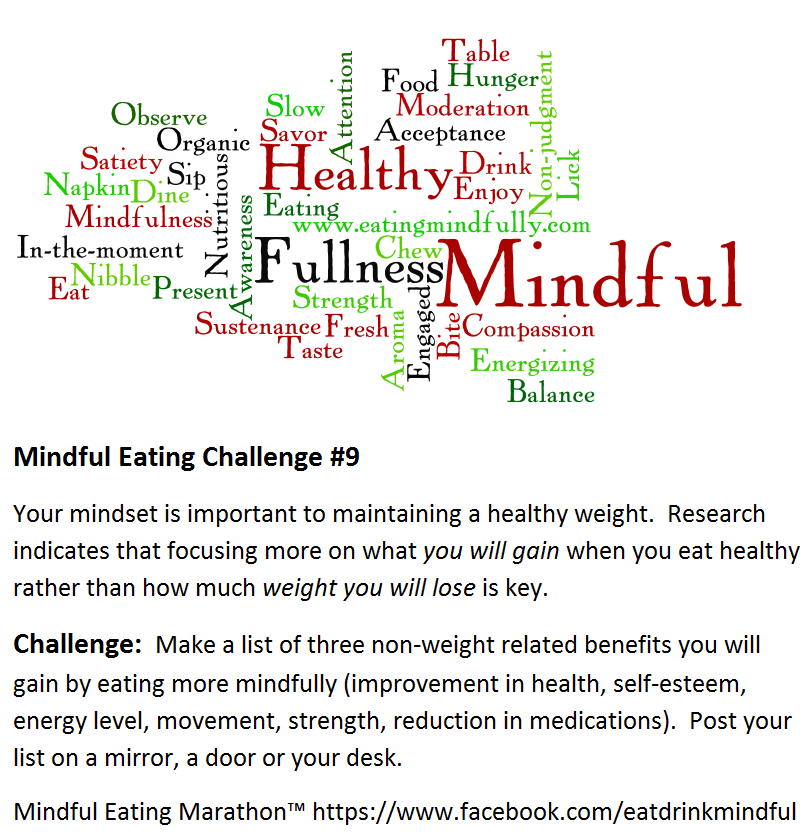 Supplements are almost always superfluous, especially if you have already tried several dishes and have given your stomach a rather difficult job. It is best to mix as few dishes as possible. In this case, you will be able to impose larger portions, but only your favorite dishes. nine0003
Supplements are almost always superfluous, especially if you have already tried several dishes and have given your stomach a rather difficult job. It is best to mix as few dishes as possible. In this case, you will be able to impose larger portions, but only your favorite dishes. nine0003
- Movement even at the table.
While moving, we feel our body and state better than when we are in static state. Offer help to the hostess, take care of those sitting nearby, step back once again to fix your hair or spin in front of the mirror.
- Chew slowly.
The slower you eat, the faster your metabolism and vice versa, if we are in a hurry, metabolism slows down, the body's ability to absorb nutrients from food decreases, appetite increases. Try to eat in such a way that your plate is not empty and stretch and savor each dish, while enjoying a pleasant conversation. nine0003
Often, we are already ready to put the next piece in our mouth, although we are still chewing the previous one.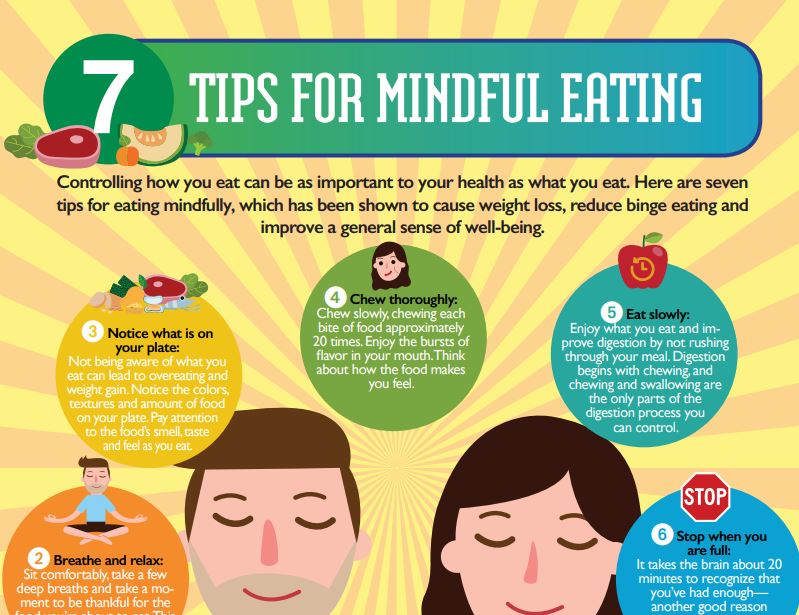 Try putting utensils on the table after each bite while you continue to chew.
Try putting utensils on the table after each bite while you continue to chew.
- Don't join the clean plate club.
Many of us remember how in childhood we were taught to eat our portion to the end. This is a great way to teach kids about a certain portion size, but adults are able to handle this task on their own. If you feel like you're almost full, leave the last few bites on your plate. No one likes to move food, but making you overeat will not help the hungry! nine0003
Mindful eating can help change unhealthy eating habits for the better, but as with any practice, mindful eating skills need to be practiced. Try some of the rules now as you gradually build your own code of mindful eating at the New Year's table. Thanks to this practice, New Year's feasts will turn for you not into trials and torments, but boundless pleasure without consequences!
We discussed the practice of mindful eating in detail at the online webinar Healthy New Year scenario .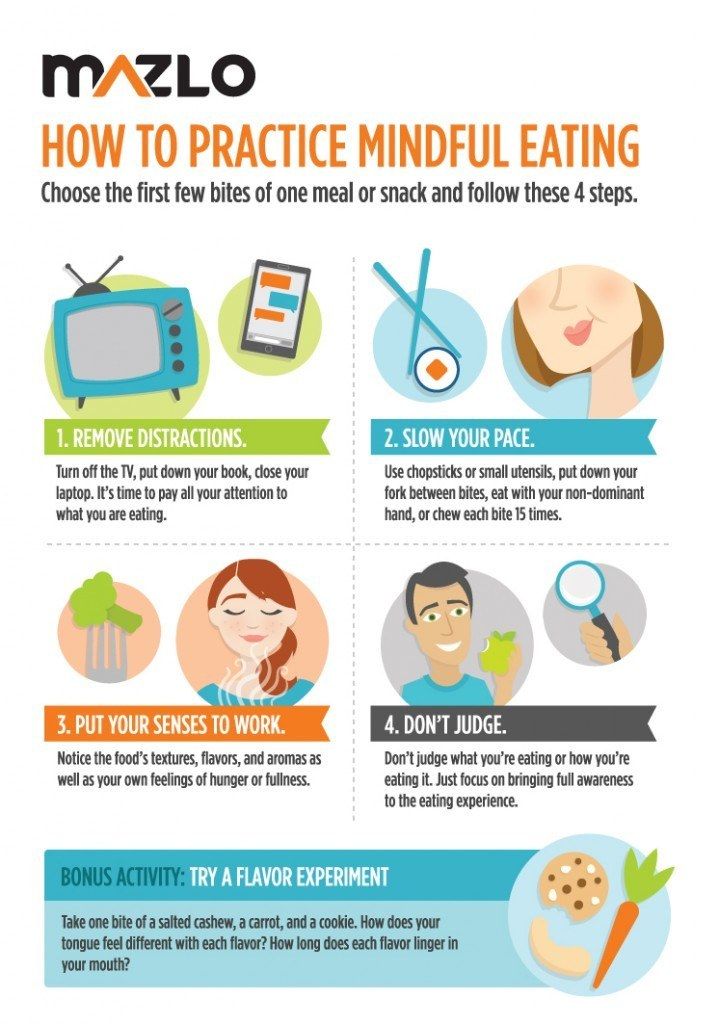
. Winter Reboot
The program will help you feel better to avoid weight gain, seasonal depression, lethargy, resist cold and humidity, solve cosmetic problems, cope with mood swings and cravings for sweet and fat, gather strength and increase energy levels, improve digestion , strengthen immunity, deal with addictions, learn to eat in harmony with the season, regularly practice yoga and spiritual practices, even out hormonal levels and synchronize with natural rhythms! nine0003
You will learn everything about cleansing, maintaining health and well-being in the autumn: practices, training, supplements, seasonal affordable nutrition, rituals, oils and herbs that will make you feel blooming like summer even in cold weather!
“ School of Seasonal Nutrition and Universal Wellbeing™” in collaboration with Vegetarian.ru magazine.
- principles of seasonal nutrition: what foods to choose to shine at any time of the year, how to make a diet, how to choose seasonal foods and cook for maximum benefit.
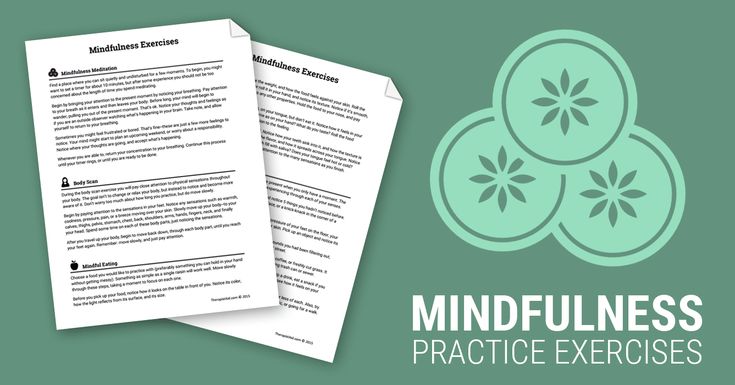 nine0040
nine0040 - natural supplements, oils and herbs to help maintain beauty, health and youth.
- seasonal affordable superfoods rich in vitamins and minerals and free of harmful additives, pesticides and herbicides.
- practices and rituals that will help us maintain vitality, find happiness and joy of being and integrity.
- regular online webinars to discuss all your concerns online.
7 principles of conscious eating or a feast without consequences
New Year's holidays are a real challenge even for those who eat right and lead a healthy lifestyle: after a generous New Year's feast with family, we go to visit friends and relatives, to Christmas meetings in cafes and restaurants, to grandma for treats ...
Russian national cuisine can hardly be called healthy. And even if you adhere to the principles of a healthy diet and try to choose only healthy foods for the festive table, after a series of holidays and plentiful treats, it is quite possible to gain a couple of extra pounds, experience such unpleasant symptoms as bloating, heaviness, fatigue and drowsiness. Quality products on the festive table - that's not all. Equally important is how we eat. nine0003
Quality products on the festive table - that's not all. Equally important is how we eat. nine0003
Previously, a long feast was a difficult test for me, breaking healthy habits, even those developed over the years. I want to share with you 7 principles of mindful eating , which will help you get maximum pleasure without harm to health, the risk of gaining extra pounds and a clouded mood! I like to call them simple, but like any practice, they get better with time.
Mindful eating refers to the practice of being in the here and now. When thoughts take us away from the process of eating, it is difficult for us to control the feeling of satiety. Research has shown that practicing mindful eating helps improve eating habits. It is especially useful for those who cannot refuse another glass of wine, are prone to jamming emotions and stress on cookies, junk food, and experience uncontrollable cravings for certain addictive foods. nine0003
Conscious eating will help you fully enjoy the taste of New Year's dishes without overeating and consequences.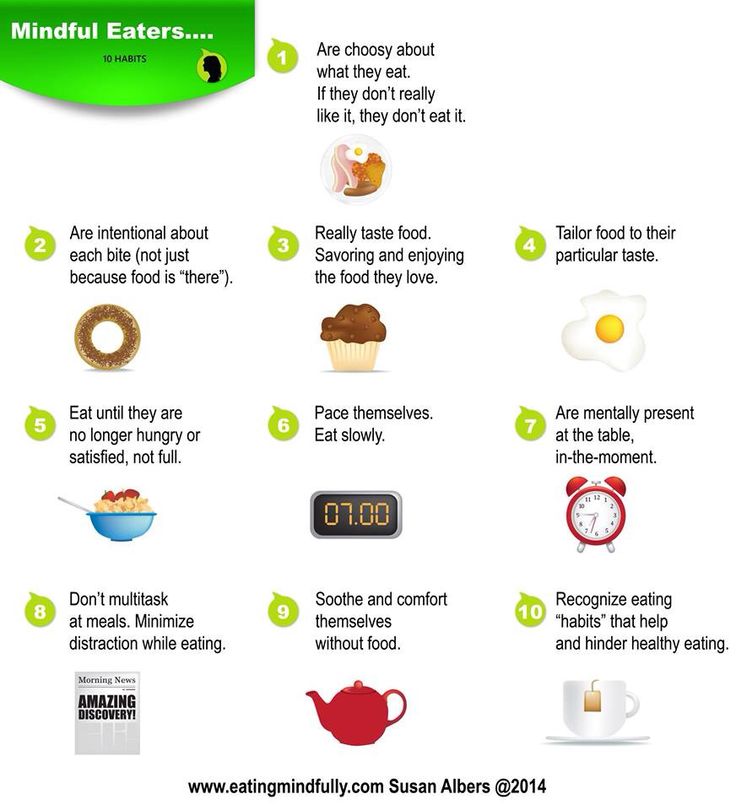 You will say that it is impossible to observe these principles at the New Year's table: in the circle of friends and relatives you will keep up the conversation, be distracted by TV or music, like a caring hostess, run to the kitchen, take care of the guests ... I want to invite you to implement these principles one by one now. This will help you develop an optimal table behavior pattern for you and the ability to feel a balance between a comfortable state and excess. Share the secrets of mindful eating with your friends, colleagues, sisters! I am sure that thanks to the principles of conscious eating, this year's festive feasts will only be joyful and bright for you! nine0003
You will say that it is impossible to observe these principles at the New Year's table: in the circle of friends and relatives you will keep up the conversation, be distracted by TV or music, like a caring hostess, run to the kitchen, take care of the guests ... I want to invite you to implement these principles one by one now. This will help you develop an optimal table behavior pattern for you and the ability to feel a balance between a comfortable state and excess. Share the secrets of mindful eating with your friends, colleagues, sisters! I am sure that thanks to the principles of conscious eating, this year's festive feasts will only be joyful and bright for you! nine0003
The mindful eating practice developed at Harvard Medical School and described below is an excellent strategy for a Healthy New Year scenario . At the New Year's Eve online webinar December 19 20:00 we will look at other techniques that will help make the holiday bright, healthy and happy!
- Observation
Before you sit down at the table, take a moment to observe how you feel at this moment. Is there a feeling of stress, hunger, rush, confusion or excitement? Try to calm the sensations and even out the emotional background. To do this, a simple concentration of attention on the breath for a minute is enough. When your cravings are controlled and not driven by emotions, the risk of overeating out of excitement or even joy is much less. nine0003
Is there a feeling of stress, hunger, rush, confusion or excitement? Try to calm the sensations and even out the emotional background. To do this, a simple concentration of attention on the breath for a minute is enough. When your cravings are controlled and not driven by emotions, the risk of overeating out of excitement or even joy is much less. nine0003
- Thanks.
Before eating, take a moment to think and thank (inwardly or aloud, if appropriate) all those people who contributed to the creation of a generous table: say "thank you" to the farmers, sellers, the hostess who prepared the food, the fertile land, the creator and who will share the festive dinner with you. Enjoy the food: taste, view, aroma, selected ingredients, skill of the hostess! Practicing gratitude will help you connect with what you eat and how you feel. nine0003
- Do not intercept while running.
If you are a hostess and prepare New Year's treats as a hostess, you will definitely have to try all the dishes.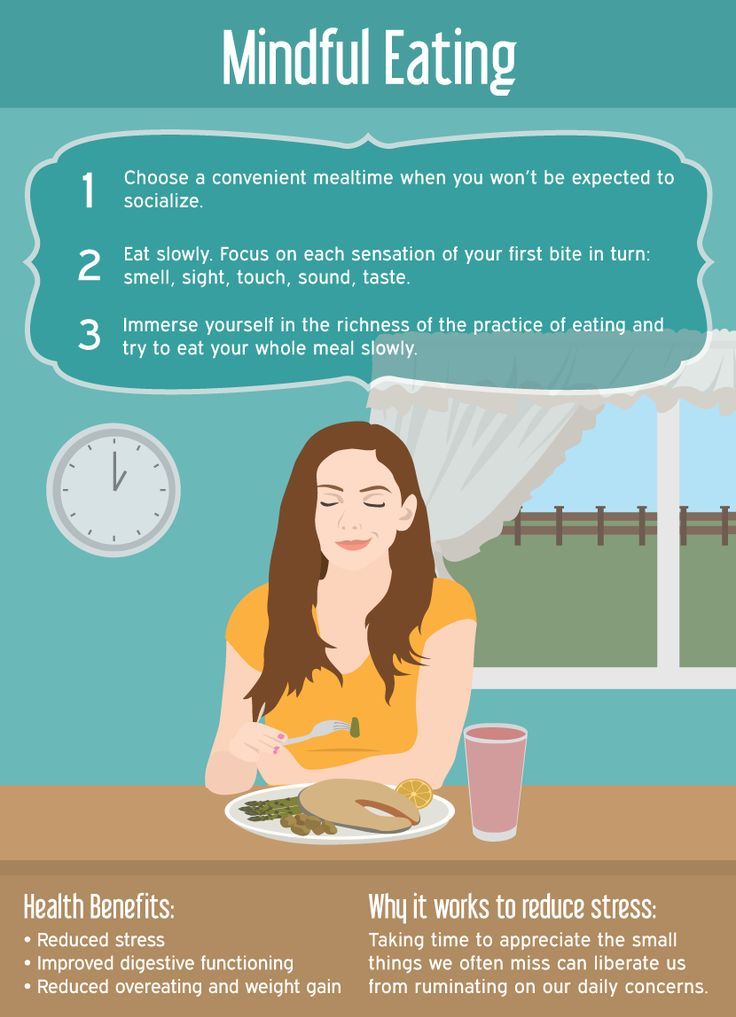 Try just a little, so as not to fill up before the gala dinner and not feel superfluous at the table. If you know that you will have to try many dishes and several times, give up one meal during the day or a snack, or do not swallow the food that you are trying.
Try just a little, so as not to fill up before the gala dinner and not feel superfluous at the table. If you know that you will have to try many dishes and several times, give up one meal during the day or a snack, or do not swallow the food that you are trying.
Every time we snack in everyday life, and especially if we do it often, we lead to an imbalance of the hormone leptin, which is responsible for the feeling of hunger. The longer the intervals between the main meals, the more real will be the feeling of hunger and satiety.
- Return to introspection.
During the New Year's table, you are likely to socialize a lot, and therefore it will be difficult to keep track of the amount eaten. Find the opportunity to take a couple of pauses and observe the sensations. If it is not very convenient to do this at the table, go to the bathroom or to the next room and observe as in point 1.
- Apply 1 serving.
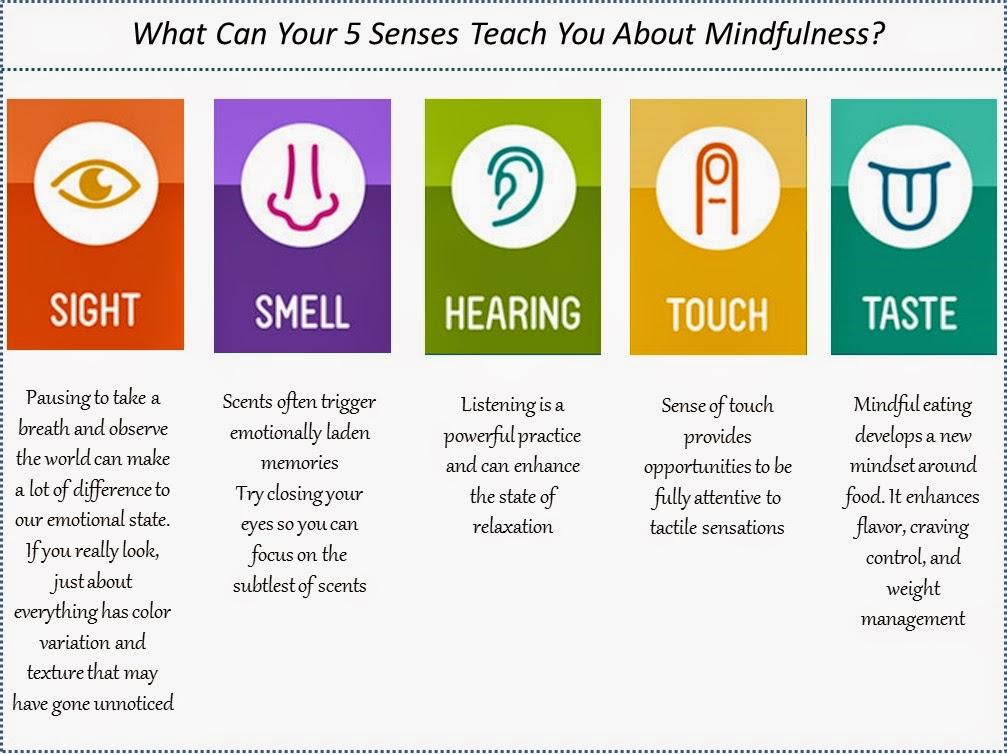
Try to follow the rule: try each dish only 1 time. Supplements are almost always superfluous, especially if you have already tried several dishes and have given your stomach a rather difficult job. It is best to mix as few dishes as possible. In this case, you will be able to impose larger portions, but only your favorite dishes.
- Movement even at the table.
While moving, we feel our body and state better than when we are in static state. Offer help to the hostess, take care of those sitting nearby, step back once again to fix your hair or spin in front of the mirror. nine0003
- Chew slowly.
The slower you eat, the faster your metabolism and vice versa: if we are in a hurry, the metabolism slows down, the body's ability to absorb nutrients from food decreases, and appetite increases. Try to eat in such a way that your plate is not empty and stretch and savor each dish, while enjoying a pleasant conversation.